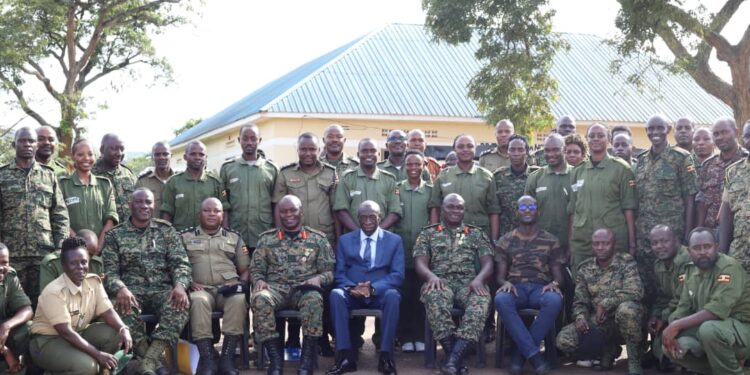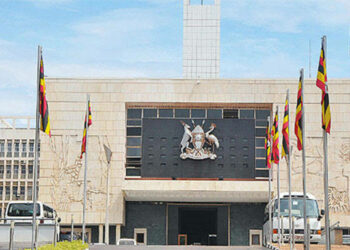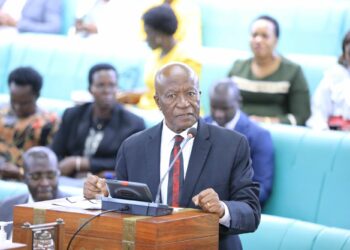In a move to promote unity, patriotism, and Pan Africanism, families and schools in the Busoga region ,eastern Uganda will begin singing the national and East African Community (EAC) anthems in Kiswahili every day.
This initiative has been announced by SP James Mubi, the Kiira Regional Police spokesperson who says it aims to foster a sense of citizenship and pride among residents, as well as encourage people-centered leadership.
Kiswahili, recognized as Africa’s first language by the African Union, has been adopted as Uganda’s second national language.
The language will play a vital role in achieving the federation of EAC member states and a unified Africa.
Mubi says a task force will lead the campaign, targeting schools, tertiary institutions, factories, markets, offices, and various other sectors in Busoga.
The region has more than 200 privately run schools and over 60 government-aided ones but more than 60% of the learners and teachers in these institutions cannot sing the two anthems in Kiswahili, which undermines the spirit of East African Community and Pan Africanism being advocated across the region and continent.
A limited number of people in urban centres of Jinja City, Iganga Municipality, Busemabatya, Kaliro, Mayuge and Bugiri speak Kiswahili.
To ensure widespread understanding,Mubi says translations of the anthems will be provided in English and local languages.
Currently, many students and community members can recite the national anthem in English but struggle with the Kiswahili version.
Conversely, while some can sing the EAC anthem in Kiswahili, they often fail to grasp its underlying message.
According to James Mubi, the campaign seeks to address these gaps and encourage all Ugandans to embrace Kiswahili as a crucial step towards regional unity and development.
Mubi says the youth will embark on productive socio-economic activities that benefit the nation.
“…by embracing the national and EAC anthems, our youth will be inspired to reject destructive behaviours like vandalism, unlawful demonstrations, and idle gossip…” he stresses.
He explains that through the anthems, they instill a sense of duty, responsibility, and unity among the youth who will recognize their obligation to protect and serve Uganda, and treat fellow East Africans as brothers and sisters, fostering a culture of cooperation and mutual benefit.
“…remember that each citizen of EAC member states is a potential investor, partner, and market, so by promoting unity and collaboration, we unlock the region’s vast potential for growth, development, and prosperity…”James Mubi remarks.
The initiative follows a successful inter-agency training themed “Strategic Communication Ideological Transformation leadership and Development Course” held at the National Leadership Institute Kyankwanzi (NALI) from 12-26 October, 2024.
The course attracted 55 participants from UPDF (strategic communication and defense engagements), Uganda Police Force (UPF), Internal Security Organization (ISO), External Security Organization (ESO), government-citizens interaction centre, patriotic citizens’ media team and others.
The pass out was presided over by the Director General(DG) ESO Ambassador Joseph Ocwet and witnessed by Brig Gen(Rtd) Charles Kisembo, who is the Director NALI
By incorporating Kiswahili into daily life, Busoga aims to strengthen national identity and regional cooperation and foster the spirit of patriotism among the youth in Uganda.
What You Need To Know:
The East African Community (EAC) anthem is a powerful symbol of unity and integration among its member states. The key messages in the EAC anthem can be broken down into three main themes:
Unity and Togetherness: The first stanza celebrates the unity of the member states and their commitment to fostering a common destiny, emphasizing the values of togetherness and collective strength.
Patriotism and Shared Heritage: The second stanza focuses on the region’s abundant natural resources, diverse landscapes, and cultural heritage, urging the member states to protect and preserve their natural environment for future generations.
Sustainable Development and Progress: The final stanza highlights the aspirations of the EAC for sustainable development, economic growth, and social progress, promoting a vision of a prosperous and inclusive East Africa.
Some of the specific lyrics that convey these themes include:
“Jumuiya Yetu sote tuilinde” (Let’s protect our community).
“Umoja wetu ni nguzo yetu” (Our unity is our strength).
“Uzalendo pia mshikamano” (Patriotism and togetherness).
“Viwandani na hata mashambani, tufanye kazi sote kwa makini” (Let’s work together in industries and farms with diligence).
Overall, the EAC anthem serves as a powerful reminder of the region’s shared values and aspirations for a brighter future.
Uganda’s national anthem, “Oh Uganda, Land of Beauty,” conveys several key messages that reflect the country’s values and aspirations.
Unity and Freedom: The anthem emphasizes the importance of unity and freedom, with lyrics like “United, free, for liberty,” together we’ll always stand.”
This reflects the country’s struggle for independence and its commitment to democratic values.
Gratitude and Pride: The anthem expresses gratitude for Uganda’s natural beauty and rich resources, describing it as “the land that feeds us, by sun and fertile soil grown.”
This sense of pride and appreciation is echoed in the line “The Pearl of Africa’s Crown.”
Peace and Friendship: The anthem also emphasizes the importance of peaceful coexistence and friendship, with lyrics like “In peace and friendship we’ll live” This reflects Uganda’s commitment to regional and international cooperation.
National Pride and Loyalty: The anthem’s opening lines, “Oh Uganda! May God uphold thee, we lay our future in thy hand”, convey a sense of national pride and loyalty, emphasizing the country’s reliance on divine guidance and protection.
Overall, Uganda’s national anthem is a powerful symbol of the country’s history, values, and aspirations.
Historical Problem:
The association of Kiswahili with security forces, particularly during the tumultuous periods of the 1960s to 1980s, indeed led to negative connotations.
Kiswahili was introduced in Uganda during the colonial era as a lingua franca for trade and administration.
However, its adoption by security forces, especially during Idi Amin Dada’s regime (1971-1979) and Obote II’s short-lived reign 1980-85), tainted its image.
Association with oppression: The use of Kiswahili by security personnel, who often employed torture and violence, created a perception that the language was synonymous with oppression, brutality, and fear.
It’s also worth noting that Kiswahili was also viewed as a language of the “bayaye” (uncouth or unrefined people).
This social stigma reinforced class divisions, with Kiswahili being associated with lower socio-economic groups or those perceived as lacking formal education.
Post-conflict reconciliation: Efforts to promote Kiswahili as a national language, as seen in the recent campaign in Busoga, aim to reclaim and rebrand the language, dissociating it from its painful past.
Reorientation and education: By emphasizing Kiswahili’s role in promoting unity, regional integration, and cultural exchange, advocates seek to reorient public perception and foster a more positive association.
Challenges and opportunities: Overcoming historical traumas and social stigmas requires sustained efforts, including education, cultural programs, and community engagement.
It’s essential to acknowledge the complexities of Kiswahili’s history in Uganda and address the lingering emotional and psychological impacts.
By doing so, Ugandans can work towards healing, reconciliation, and a more inclusive national identity.
Why A Common Language:
A common language plays a vital role in humanity’s social, economic, cultural, and political development.
It facilitates seamless interaction, fostering unity, cooperation, and understanding among people.
Africa, with over 2,000 languages, faces significant communication challenges.
A common language can promote unity, cooperation, and regional integration, as envisioned by the African Union.
It can simplify trade, commerce, and innovation across linguistic and cultural boundaries, making it easier to document and share Africa’s rich cultural diversity through a common language.
A common language also facilitates access to knowledge, educational resources, and cultural exchange.
Do you have a story in your community or an opinion to share with us: Email us at editorial@watchdoguganda.com













